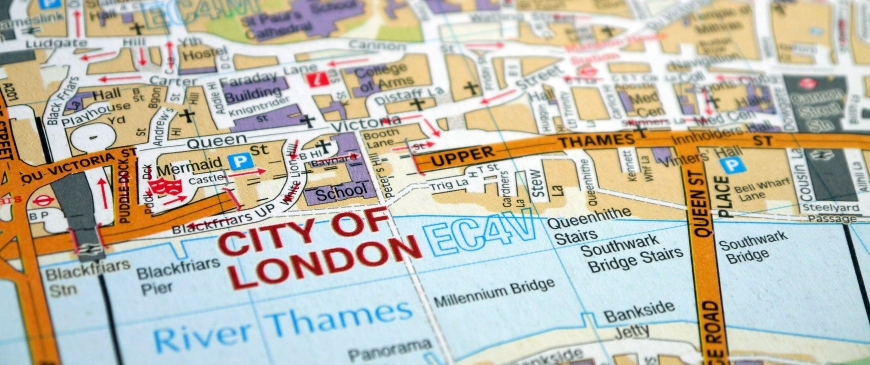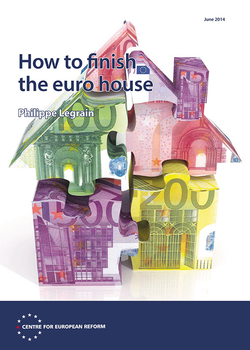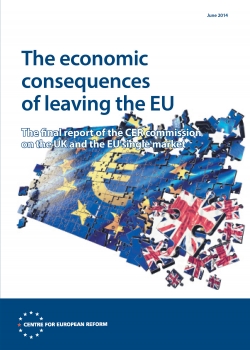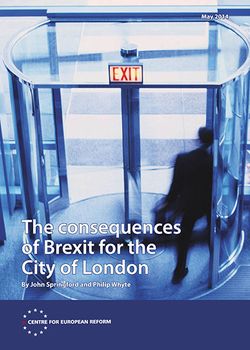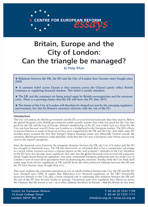Financial services & regulation
The low-hanging fruit of European capital markets
08 April 2015
The planned capital markets union in Europe faces many obstacles. Commissioner Hill was right to start with the lower-hanging fruit.
Quantitative easing alone will not ward off deflation
21 January 2015
Quantitative easing alone will do little to boost the eurozone economy. The ECB needs to shift expectations and this requires a different approach to monetary policy.
Greece will remain in the euro for now
16 January 2015
Neither Greece nor the eurozone want Grexit, and it is unlikely to happen. But neogiations will be difficult and uncertainties over Greece's membership will persist.
The ECB is not the German central bank
02 December 2014
The ECB should stop waiting for German approval of more aggressive monetary policy, and Germany should back the ECB more openly.
Public investment: A modest proposal
01 December 2014
A eurozone-wide public investment stimulus is neither impossible nor mad, but should be part of a strategy to pull the economy off the rocks.
Unlocking Europe's capital markets union
15 October 2014
The goal of a capital markets union should be to develop healthy non-bank sources of finance. This should be achieved mainly by liberating, not controlling markets.
The banking union alone cannot bring recovery
29 July 2014
The banking union is a work in progress but a significant step in the right direction. However, it will not be enough for a proper recovery.
The eurozone's real interest rate problem
08 July 2014
Aggressive fiscal and regulatory policies are needed to counteract the effects of divergent real interest rates in the eurozone – but this is not happening.
How to finish the euro house
17 June 2014
Eurozone governance is politically unsustainable: its rules and institutions favour creditor over debtor countries. Eurozone policy-makers need to change direction before it is too late.
The economic consequences of leaving the EU
09 June 2014
A group of experts finds that, after leaving the EU, the UK would face an invidious choice: sign up to the single market’s rules, or suffer economic damage.In April 2016 an updated version of the report The economic consequences of leaving the EU: The final report of the CER commission on Brexit 2016 was published.
Presidential candidates, European federalism and Tony Giddens
15 May 2014
The problem with ‘federalism’ is that most European citizens do not want it. This makes the federalist proposals in Tony Giddens’ new book unrealistic.
The consequences of Brexit for the City of London
08 May 2014
If Britain leaves the EU, the City of London will lose access to European markets – unless the UK aligns its financial rules with those of the EU.
Quantitative easing alone will not do the trick
28 April 2014
In the eurozone, quantitative easing by itself is unlikely to be effective. The European Central Bank needs to change the way it manages people’s expectations, too.
Why British prosperity is hobbled by a rigged land market
13 February 2013
The British have the least living space, highest office rents and most congested infrastructure in the EU-15. A rigged market for land is to blame.
What a banking union means for Europe
05 December 2012
A full banking union is needed to stabilise the eurozone. However, even an embryonic union could drive a wedge between the eurozone and the EU-27.
A banking union – it is necessary, but is it likely?
27 July 2012
Could the EU's summit of June 29 come to be regarded as a watershed? Following umpteen crisis summits that have failed to tackle the root causes of the eurozone crisis, EU leaders finally got to the heart of the matter: the need to break the vicious interaction between weak banks...
Issue 85 - 2012
27 July 2012
- Europe needs a Rooseveltian break with fear, Hugo Brady
- A banking union – it is necessary, but is it likely?, Philip Whyte
- Is the Franco-British defence treaty in trouble?, Tomas Valasek
Britain, Europe and the City of London: Can the triangle be managed?
20 July 2012
The City of London's future will be shaped not just by a tougher regulatory environment, but also by uncertainties about Britain's relations with the EU.
Issue 83 - 2012
23 March 2012
- How to keep Britain in the EU, Charles Grant
- Stable public finances require stronger business investment, Simon Tilford
- A new political bargain in Afghanistan, Edward Burke
Issue 82 - 2012
27 January 2012
- Needed: A growth strategy for Europe, Simon Tilford
- Why an EU financial transactions tax is a red herring, Philip Whyte
- The US declares peace in Europe, prematurely, Tomas Valasek



